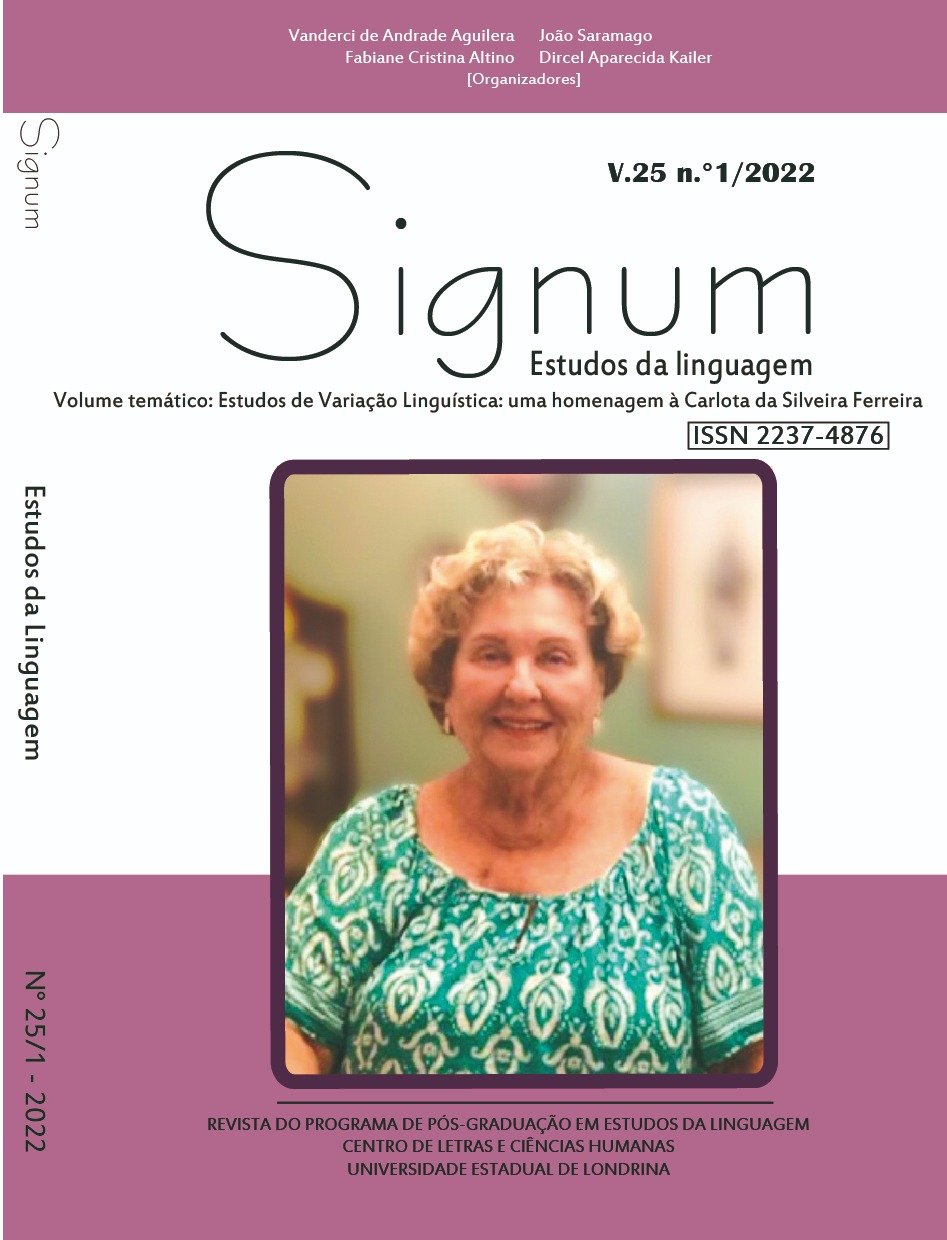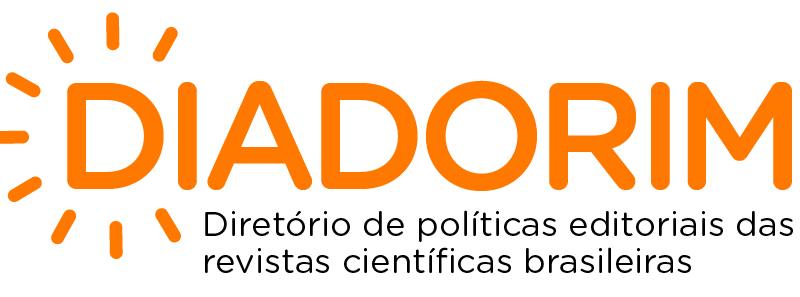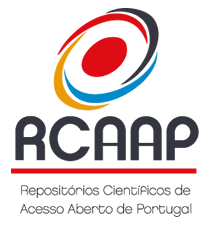The Variation in the Reduction of the Diphthong Au from Latin to Portuguese
DOI:
https://doi.org/10.5433/2237-4876.2022v25n1p136Keywords:
Diachronic variation, Diphthong, MonophtongizationAbstract
This work intends to discuss the variation of the reduction phenomenon of the primary diphthong au from Latin to Portuguese. We believe that, since past synchronies, it is possible to identify linguistic and socio-historic motivations that can explain the occurrence of the phenomenon that persists modernly as a mark of orality. With the theorical support of Historical Sociolinguistics, we examined studies that seek an explanation inside diachrony to the phenomenon of the au diphthong reduction. We verified that this phenomenon already occurred orally in the less cultured Latin as proven by the sources from vulgar Latin, however, it has not necessarily evolved to changes in the romance languages. Due to the preservation of the au diphthong in the written register of cultured Latin, the phenomenon realizes itself again in the transition to the romance languages and continues to be represented as a variant in medieval Portuguese and eighteenth-century Portuguese corpora in Brazil. The socio[1]historical motivation points towards a less careful speech as an indication of the social status of the speaker/writer. The linguistic motivation is related to the conditioning environment of the phenomenon of the au diphthong reduction in front of occlusive consonants and with /S/ complex syllables, according to Oliveira (2008).
Downloads
References
ALKIRE, Ti; ROSEN, Carol. The Evolution of stressed vowels. In: ALKIRE, Ti; ROSEN, Carol. Romance languages: a historical introduction. Cambridge: Cambridge University Press, 2010. p. 5-25.
ARAUJO, Ruy Magalhães de. Fontes do latim vulgar. SOLETRAS, São Gonçalo, n. 5-6, p. 96-115, 2003.
BASSETTO, Bruno Fregni. Filologia românica: história externa das línguas românicas. São Paulo: Editora da Universidade de São Paulo, 2013.
BIANCHET, Sandra Maria Gualberto Braga. Alterações fonético-fonológicas no latim do século I d.C: descrição do sistema vocálico latino a partir do Satyricon, de Petrônio. Classica - Revista Brasileira De Estudos Clássicos, São Paulo, v. 15, n. 15/16, p. 189-202, 2003.
BUSARELLO, Raulino. Dicionário básico latino português. Florianópolis: Editora da UFSC, 2007.
CÂMARA JÚNIOR, Joaquim Mattoso. História e estrutura da Língua portuguesa. Rio de Janeiro: Padrão, 1979.
CARVALHO, Maria José S. Pereira. Ditongos orais e seus processos evolutivos na história do Português. Estudos de Linguística Galega, Santiago de Compostela, v. 10, p. 41-54, 2018.
CONDE SILVESTRE, Juan Camilo. Sociolinguística histórica. Madrid: Gredos, 2007.
COUTINHO, Ismael de Lima. Pontos de gramática histórica. São Paulo: Companhia Editora Nacional, 1938.
CUNHA, Antônio Geraldo da. Dicionário etimológico da língua portuguesa. Rio de Janeiro: Lexikon, 2010.
DIAS, Ana Paula Veloso Pratas. Variação ou ~ oi em Portugal continental: delimitação das áreas geográficas com maior incidência do ditongo oi. Diacrítica, Braga, v. 28, n. 1, p. 51-67, 2014.
FARIA, Ernesto. Fonética histórica do Latim. Rio de Janeiro: Livraria Acadêmica, 1955.
HUSBAND, Richard Wellington. The diphthong - Ui in Latin. Transactions and Proceedings of the American Philological Association, Ithaka, v. 41, p. 19-23, 1910. Disponível em: www.jstor.org/stable/282713. Acesso em: 28 abr. 2021.
ILARI, Rodolfo. Linguística românica. São Paulo: Editora Ática, 1999.
LABOV, William. On the mechanism of linguistic change. In: GUMPERZ, John J; HYMES, Dell (ed.). Directions in sociolinguistics: the ethnography of communication. New York: Hold, Rinehart and Winstion, 1972.
LABOV, William. The use of the present to explain the past. In: LABOV, William. Principles of linguistic change: internal factors. Oxford: Blackwell, 1999. p. 9-27.
LASS, Roger. Historical linguistics and language change. Cambridge: Cambridge University Press, 1997.
LIPSKI, John M. The reduction of falling diphthongs. RRI, Bucareste, v. xix, n. 5, p. 415-435, 1974.
MAURER JUNIOR, Theodoro Henrique. Gramática do latim vulgar. Rio de Janeiro: Livraria Acadêmica, 1959.
NIEDERMANN, Max. Précis de phonetique historique du latin. Paris: Éditions Klincksieck, 1991.
OLIVEIRA, Klebson. O verso e o reverso: redução de ditongos e ditongação em textos escritos por negros no Brasil oitocentista. Signum: Estudos da Linguagem, Londrina, v. 11, n. 2, p. 155-175, 2008.
ORBIS LATINUS. Vocabulary of the Vulgar Latin. Appendix probi: list of correct and incorrect forms of 227 words (3rd-4th centuries AD). Disponível em: http://www.orbilat.com/Languages/Latin_Vulgar/Vocabulary/Appendix_Probi.html. Acesso em: 20 maio 2021.
QUEDNAU, Laura Rosane. Os ditongos do latim ao português. Letras de Hoje, Porto Alegre, v. 4, n. 3,p. 89-99, 2005.
ROMAINE, Suzanne. Socio-historical linguistics: its status and methodology. Cambridge: Cambridge University Press, 1982.
SANTOS, Susana Gabriela Mendes dos. O latim das inscrições romanas em território português até à queda do império. 2005. 139 f. Dissertação (Mestrado em Estudos Clássicos) - Universidade de Lisboa, Lisboa, 2005.
SOUZA, Maria Helena Menezes de; SILVA, Suziane de Oliveira Porto. Os caminhos e descaminhos da sociolinguística histórica no Brasil. Revista da ABRALIN, Aracaju, v. 19, n. 2, p. 1-5, 2020.
SPENCE, Nicol Christopher William. Quantity and quality in the vowel-system of Vulgar Latin. Word,New York, v. 21, n. 1, p. 1-18, 1965.
VÄÄNÄNEN, Veikko. Introducción al latín vulgar. Madrid: Editorial Gredos, 1968.
WEINREICH, Uriel; LABOV, William; HERZOG, Marvin I. Fundamentos empíricos para uma teoria da mudança linguística. São Paulo: Parábola, 2006.
Downloads
Published
How to Cite
Issue
Section
License
Copyright (c) 2022 Signum: Estudos da Linguagem

This work is licensed under a Creative Commons Attribution-NonCommercial-NoDerivatives 4.0 International License.
This journal reserves the right to make, in the originals, normative, orthographic and grammatical modifications in order to maintain the standard language and the credibility of the publication. It will respect, however, the authors' style of writing. Modifications, corrections and suggestions of conceptual order will be forwarded to the authors, if necessary. In these cases, the papers, once appropriate, should be submitted to a new appreciation. The final examinations will not be forwarded to the authors. Works published become property of Signum, being its total or partial reprint subject to an explicit authorization of the journal. In all subsequent quotes the original source of publication should be mentioned, in case, in Photographic Discourse. Opinions emitted by the authors are their exclusive responsibility.
















